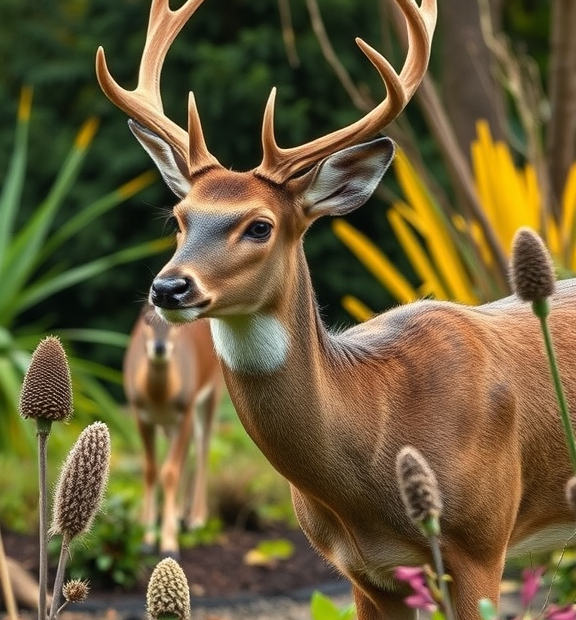Effective Strategies to Keep Deer Out of Your Garden
If you’re a gardener, you know how much effort it takes to grow beautiful plants and vegetables. However, keep in mind that deer can quickly turn your hard work into a feasting ground. It’s essential to find effective strategies to keep deer out of your garden so you can enjoy the fruits of your labor without unwanted visitors munching on your plants.
Utilize Fencing Wisely
Installing a sturdy fence is one of the most effective ways to keep deer away. Follow these tips to make your fencing most effective:
- Height Matters: Fences should be at least 8 feet tall. Deer are excellent jumpers, so if your fence is shorter, they may still get in.
- Choose the Right Material: Wire fences work well, but you can also consider deer-resistant options like vinyl or wooden fences for durability.
- Buried Bottom: Bury the bottom of the fence a foot deep to prevent deer from digging underneath.
Plant Deer-Resistant Varieties
Choosing the right plants can help keep deer away naturally. Deer tend to avoid plants with strong scents or textures. Here are a few options:
- Lavender: Its fragrant and strong scent can repel deer.
- Rosemary: Another aromatic herb that deer dislike.
- Thorns: Consider plants like holly or thorny roses, as deer tend to shy away from thorny varieties.
Use Scents and Repellents
Deer rely heavily on their sense of smell, so using certain scents can keep them at bay. Here are some popular deer repellents:
- Commercial Repellents: Sprays that have scents deer dislike, such as putrescent egg solids or garlic, can be effective.
- Homemade Solutions: Mix water with dish soap and crushed garlic or hot pepper to create an effective spray.
- Other Scents: Soaking rags in ammonia or vinegar and hanging them around the garden can deter deer.
Create Motion Deterrents
Deer are easily startled by sudden movements. Installing motion-activated devices can help keep them away:
- Motion-Activated Sprinklers: These devices release a burst of water when they detect motion, surprising deer.
- Noise Makers: Wind chimes or bells can create noise that startles deer and keeps them away.
Companion Planting
Companion planting is a great way to use plants’ natural properties to your advantage. Some plants can repel deer while others attract beneficial insects. Here are combinations to consider:
- Strong-Scented Herbs: Planting garlic or mint alongside vulnerable plants can repel deer.
- Marigolds: These flowers not only deter deer but also help repel other pests.
Install Visual Barriers
Creating a visual barrier in your garden can also deter deer. Here are some ideas:
- Netting: Use garden netting to cover your plants, making it difficult for deer to access them.
- Potted Plants: When possible, keep valuable plants in pots and elevate them. Deer may have a harder time reaching them.
Regular Maintenance
Love what I do? Be a hero and help me keep creating awesome content!
Support My Mission Now!Every donation fuels more great stuff – thank you, legend!
Keeping your garden tidy can also deter deer. Here are some tips for maintaining your garden:
- Mow Often: Keeping grass short can make deer feel more exposed and vulnerable, discouraging them from coming into your garden.
- Remove Attractive Debris: Clear fallen fruits and vegetables, as these can attract deer looking for an easy meal.
By employing these strategies, you can effectively keep deer out of your garden. You’ll not only protect your plants but also enjoy a thriving garden free from the threat of deer damage. Every garden can flourish when the right precautions are taken, allowing you to reap the rewards of your gardening efforts! Remember, consistency is key, so regularly check on your garden and make adjustments as needed.
Understanding Deer Behavior to Protect Your Plants
Love what I do? Be a hero and help me keep creating awesome content!
Support My Mission Now!Every donation fuels more great stuff – thank you, legend!
Understanding the behavior of deer can be an essential step in protecting your garden and ensuring your plants thrive. These animals are known for their beauty and grace, but they can wreak havoc on your carefully cultivated flowers and vegetables. If you want to keep deer out of your garden, it’s important to understand their habits, preferences, and the ways you can deter them effectively.
Deer Feeding Habits
Deer are most active during dawn and dusk, which is when they tend to wander into gardens searching for food. They primarily eat:
- Fruits and vegetables like apples, carrots, and lettuce
- Flowers such as tulips and roses
- Grasses and shrubs
Being aware of their feeding preferences helps you select plants that may be less appealing to them. For instance, some plants stand out as deer-resistant options. Native plants, herbs like lavender, and strong-smelling flowers can often keep deer at bay.
Understanding Their Senses
Love what I do? Be a hero and help me keep creating awesome content!
Support My Mission Now!Every donation fuels more great stuff – thank you, legend!
Deer have sharp senses that they use to find food and detect danger. Their keen sense of smell allows them to locate food from several hundred feet away. They also have excellent night vision, which helps them forage in low-light conditions. Here are a few characteristics to keep in mind:
- Deer are cautious animals and tend to stay close to cover.
- They can smell strongly scented plants, so consider incorporating these in your garden.
- Movement and noise can deter deer; therefore, wind chimes or motion-activated devices can help.
Factors Influencing Deer Movement
Several factors can influence why deer visit your garden. Understanding these can provide insights into how to deter them effectively.
- Habitat: Deer are most likely to invade gardens that are close to their preferred habitats, such as wooded areas or parks.
- Season: During spring and summer, deer are particularly drawn to gardens as they seek fresh greenery. In winter, they may venture into urban areas for food.
- Population Density: In areas with high deer populations, gardens are more likely to be targeted.
Effective Strategies to Keep Deer Away
Love what I do? Be a hero and help me keep creating awesome content!
Support My Mission Now!Every donation fuels more great stuff – thank you, legend!
Now that you understand deer behavior and their preferences, let’s explore some strategies to keep them out of your garden.
- Fencing: A sturdy fence is one of the most effective ways to prevent deer from entering your garden. Aim for a height of at least 8 feet, as deer are excellent jumpers.
- Repellents: Use commercial deer repellents or natural deterrents like garlic, pepper, or human hair around your plants to make them less appealing.
- Companion Planting: Consider planting less tasty, deer-resistant varieties alongside your more desirable plants to create a barrier.
- Scare Tactics: Utilize noise-makers, reflective objects, or even decoys to scare deer away. Moving these items around regularly can make them more effective.
Monitoring and Adapting Your Strategy
Deer behaviors may change depending on various factors, including their confidence in the area. It’s important to monitor your garden regularly and adapt your strategies as necessary. If you notice deer returning, try changing up your repellent methods or adjusting your planting layout.
Ultimately, keeping deer out of your garden requires a mix of understanding their behavior and implementing proven strategies. By being proactive and aware, you can create a beautiful garden that remains untouched by these hungry visitors. Tailoring your approach based on the unique aspects of your garden and local deer habits will yield the best results in safeguarding your plants.
Conclusion
Keeping deer out of your garden involves a combination of effective strategies and a solid understanding of deer behavior. By employing measures such as fencing, repellents, and companion planting, you can create an environment that deters deer from munching on your precious greens. Fences should be tall enough to prevent jumping, while creative installations can further enhance their effectiveness.
Understanding deer behavior is equally critical. For instance, knowing their feeding patterns and preferred plants allows you to make informed decisions about what to grow and when. Utilizing scents and sounds that deer find unpleasant can also contribute significantly to keeping them at bay. For example, using human hair, predator urine, or even loud noises can help keep these curious creatures from invading your garden.
Ultimately, your proactive approach to deer management will not only protect your plants but also nurture a thriving garden. While there’s no foolproof method to eliminate deer completely, combining these strategies can create a comprehensive defense that significantly reduces the chances of deer visits. Remember, it’s about finding the right balance that works for your specific situation. With some patience and experimentation, you can cultivate a resilient garden that flourishes without the threat of deer interference. Embrace these tips, and enjoy the beauty and bounty of a deer-free garden environment.

